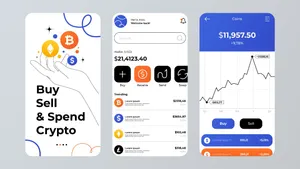Robinhood and Coinbase are the two most popular entry points into the cryptocurrency market. While both apps are simple and user-friendly, they were built for two fundamentally different investors:
- Robinhood: A traditional stockbroker that added a small crypto selection. It is an all-in-one platform for stocks, options, and crypto.
- Coinbase: A full-service crypto exchange built for maximum security and a wide selection of digital assets. It is a crypto specialist.
For someone looking to buy both stocks and crypto in one place—the choice depends on where you prioritize convenience versus security and asset depth.
The Convenience vs. Depth Trade-Off
| Feature | Robinhood | Coinbase | Verdict |
| Asset Breadth | Stocks, Options, ETFs, and 35+ Cryptos | 260+ Cryptocurrencies (no stocks) | Coinbase wins for crypto variety. Robinhood wins for all-in-one investing. |
| Simplicity/UX | Best All-in-One UX (Seamlessly switch between assets) | Best Crypto-Only UX (Streamlined, easy to navigate) | |
| Passive Income | Staking available on a limited selection (e.g., Ethereum, Solana). | Staking available on 15+ assets and offers rewards programs. | Coinbase wins for passive earning opportunities. |
The Fee Trap (Simple vs. Advanced Trading)
Both platforms claim $0 commission, but their pricing models are fundamentally different.
1. Robinhood (The Spread Model)

Robinhood charges $0 commission on crypto. It makes its money by routing trades to market makers and through a spread—a tiny markup in the price you pay to buy or sell.
- Pro: The price you see is the final price, which is simple and transparent for small trades.
- Con: The cost is often baked into the execution price, making it difficult to verify if you got the best deal.
2. Coinbase (Simple vs. Advanced)

Coinbase's simple app interface is expensive, but its Advanced Trade platform offers transparent, low fees.
- Simple App Fees: For quick buys, the main Coinbase app charges fees that can be high, often between 0.5% and 4.5% depending on the payment method (debit card being the most expensive).
- Advanced Trade Fees: You can switch to the free Coinbase Advanced platform to use a volume-based maker/taker fee model, which is much cheaper (as low as 0.00% to 0.60%).
Fee Verdict: If you only trade crypto, Coinbase Advanced is mathematically cheaper than the Robinhood spread model for frequent traders.
Security, Control, and Trust
For serious crypto investors, security and control over private keys are non-negotiable.
1. Asset Ownership and Wallet Control
- Coinbase: Coinbase provides users with an encrypted code that grants access to their purchased cryptocurrencies. Users can transfer their assets to an external digital wallet, giving them self-custody.
- Robinhood: Robinhood does not let users transfer their crypto assets out of their accounts (though it offers a separate self-custody Robinhood Wallet). Assets remain within the Robinhood brokerage.
2. Investor Protection
- Brokerage Assets: Robinhood offers SIPC coverage for stocks, ETFs, and cash in case of company insolvency.
- Crypto Assets: SIPC protection does not extend to crypto assets on Robinhood. Coinbase keeps 98% of its digital assets in secure cold storage and holds an insurance policy to cover potential breaches of assets held in hot wallets.
Final Verdict: Match the Platform to Your Primary Asset
The best platform for you depends on where you want to focus your money:
- Choose Robinhood if: You are primarily a stock, ETF, and options investor who only wants to dabble in a small, curated list of major cryptocurrencies in one place.
- Choose Coinbase if: You are a dedicated crypto investor who needs access to staking rewards, a broader selection of altcoins (260+), and control over transferring assets to an external wallet. You must commit to using the Coinbase Advanced platform to save money on fees.






